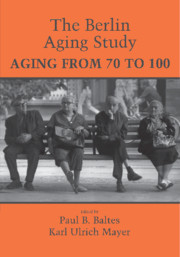Book contents
- Frontmatter
- Contents
- Acknowledgments
- Introduction
- Part A Theoretical Orientations and Methods
- Part B Major Results from the Four Research Units
- Part C Interdisciplinary Findings
- 9 Men and Women in the Berlin Aging Study
- 10 Social Relationships in Old Age
- 11 Self, Personality, and Life Regulation: Facets of Psychological Resilience in Old Age
- 12 Limits and Potentials of Intellectual Functioning in Old Age
- 13 Sensory Systems in Old Age
- 14 Everyday Competence in Old and Very Old Age: Theoretical Considerations and Empirical Findings
- 15 On the Significance of Morbidity and Disability in Old Age
- 16 The Utilization of Medical and Nursing Care in Old Age
- 17 Sources of Well-Being in Very Old Age
- Part D Overview and Outlook
- Notes on Contributors
- Abbreviations
- Author Index
- Subject Index
14 - Everyday Competence in Old and Very Old Age: Theoretical Considerations and Empirical Findings
Published online by Cambridge University Press: 06 December 2010
- Frontmatter
- Contents
- Acknowledgments
- Introduction
- Part A Theoretical Orientations and Methods
- Part B Major Results from the Four Research Units
- Part C Interdisciplinary Findings
- 9 Men and Women in the Berlin Aging Study
- 10 Social Relationships in Old Age
- 11 Self, Personality, and Life Regulation: Facets of Psychological Resilience in Old Age
- 12 Limits and Potentials of Intellectual Functioning in Old Age
- 13 Sensory Systems in Old Age
- 14 Everyday Competence in Old and Very Old Age: Theoretical Considerations and Empirical Findings
- 15 On the Significance of Morbidity and Disability in Old Age
- 16 The Utilization of Medical and Nursing Care in Old Age
- 17 Sources of Well-Being in Very Old Age
- Part D Overview and Outlook
- Notes on Contributors
- Abbreviations
- Author Index
- Subject Index
Summary
In this chapter we focus on the construction of a model of everyday competence, differentiating between a basic level of competence (BaCo), defined mainly by self-care related activities, and an expanded level of competence (ExCo), reflecting mostly discretionary or optional activities such as leisure, social, and instrumental activities of daily living. Since BaCo encompasses highly automatized and routinized activities that are necessary for survival, it is thought to be predicted foremost by health-related resources. In contrast, ExCo encompasses activities that are based on individual preferences, skills, motivations, and interests, and therefore should be more dependent on psychosocial resources. To test this model, a multidimensional or multivariable assessment of the two components and their predictors is necessary. The Berlin Aging Study (BASE) provides such a context. The findings support the model: A total of 91% of the reliable variance in ExCo and 86% in BaCo can be explained by the predictors. Furthermore, all age-related variance in everyday competence is accounted for by these health-related and psychosocial predictors. Theoretical and practical implications of the findings are discussed.
Introduction
Mastery of one's daily life and effective coping with daily demands are considered prerequisites for independent and autonomous living in old age. In the case of mastery, the person is said to be competent, specifically, to exhibit “everyday competence.”
- Type
- Chapter
- Information
- The Berlin Aging StudyAging from 70 to 100, pp. 384 - 402Publisher: Cambridge University PressPrint publication year: 1998
- 9
- Cited by



